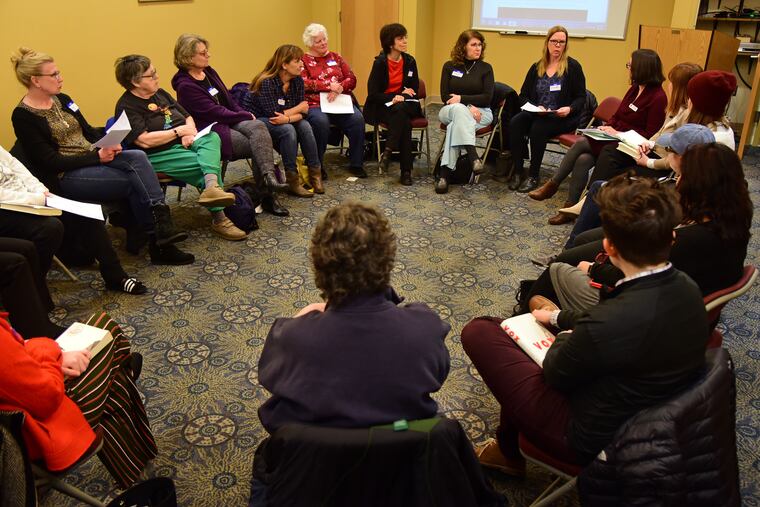This South Jersey book club tackles ‘Everyday Sexism,’ ‘Difficult Women’
“Strangers often feel comfortable sharing really personal experiences here. They become these moments that empower us all.”

This profile is part of a four-week series on local women’s groups in honor of Women’s History Month. Read previous profiles here and here.
On a recent Tuesday evening, 20 women gathered in a circle at the Cherry Hill Public Library. They were there for one purpose: to discuss Christina Dalcher’s Vox, a dystopian thriller that imagines a world where women are allowed to speak only 100 words per day.
It’s one of the many selections of the Cherry Hill Feminist Book Club, a group that meets four times a year to discuss books written by women about women. From memoirs and short stories to comedic essays and literary journalism, each text explores feminist themes, shedding light on topics that often feel close to home.
On that night, the group explored how unconscious bias affected Sonia, one of the main characters in Vox. A question drew personal anecdotes from the dozen-plus participants.
“I remember when I went through the VA to get a mortgage, and I was forced to sign a document that said I wouldn’t get pregnant,” said Norrine Regetz. “I was young and frightened, and I needed a place to live, so I signed it. It’d be unheard of today.” (Regetz declined to divulge her age but said she’s “older than dirt.”)
Minutes later, a younger participant chimed in. “As a female with short hair and masculine dress, I deal with unconscious bias every day. It’s frustrating,” said Natasha Sleigh, 28, of Winslow Township. “Walking into a public restroom, just to go to the bathroom — it’s one of my least favorite things to do.”
One member shared a memory of when she was the only woman in her high school physics class; she said that every morning, the teacher gave her a look or made a comment insinuating, “You’re wasting space here.” Another reader talked about her first job, a position she and a male counterpart entered at the same time. “Guess who was the designated coffee gopher for the next year — not him,” she said.
Such moments — when members open up — are in part what prompted Laverne Mann, director of the Cherry Hill Public Library, to launch the book club.
“Because it’s a group of like-minded feminists, strangers often feel comfortable sharing really personal experiences here. They become these moments that empower us all,” Mann said.
On the heels of the Women’s March in January 2017, Mann noticed exponential growth in the amount of contemporary feminist literature coming through the library. She wanted to make sure some of those books landed on her to-read list, and also to create a space where women felt at ease discussing gender equality. She started the club that March; since then, the group has read nine books, with each meeting bringing in between 10 and 20 people from its 450 members.
The Vox discussion drew laughter and a few tears. The participants’ ages range from 23 to 75 — a multigenerational span that is perhaps one of the club’s greatest attributes.
“People grew up in all different time periods, which always brings so many different perspectives and makes the conversation really rich,” said librarian Tierney Miller, who leads the group with Mann. “This really hit when we read the book Everyday Sexism. It’s an analysis of the different types of harassment and sexism most women experience.”
Miller said some of the older women spoke about overt displays of sexism, like being turned down for jobs solely because of their sex. Younger participants talked of sexual harassment experiences on the street and in male-dominated workplaces.
“There was definitely shock on both sides," Miller said. "Younger women who couldn’t believe what the generations before them had to go through, and older women who were shocked at the extent of what women are still dealing with today.”
Miller and Mann keep a list of potential book options. At each meeting, a few titles are chosen for members to vote on. “If we’ve read something difficult and grim, we’ll aim to provide options with more humor on the next go-round,” Miller said.
The first book the book club tackled was Roxane Gay’s Difficult Women, a collection of fictional short stories addressing topics often heavy in subject matter, like the loss of a child and sexual abuse. Other reads include memoirs, such as Redefining Realness, Janet Mock’s coming-of-age story about life as a transwoman; and activist nonfiction like Anne Helen Petersen’s Too Fat, Too Slutty, Too Loud: The Rise and Reign of the Unruly Woman, a look at the way pop culture and media portray celebrity women.
The club uses Meetup.com to announce forthcoming books and discussion dates. Anyone who identifies as a woman is welcome to attend. Next up is Shrill by Lindy West, to be discussed on June 11.
“Storytelling is the best tool we have for change,” Miller said. “When people hear and read other people’s stories, they start to understand others better, and this creates empathy.”